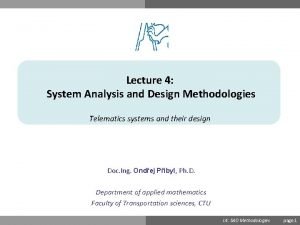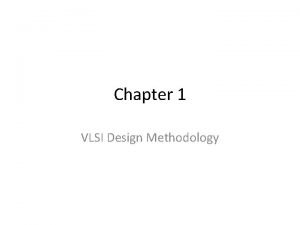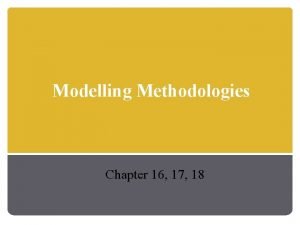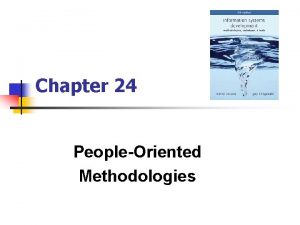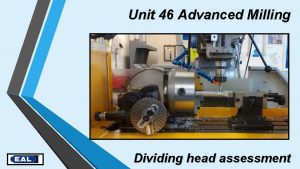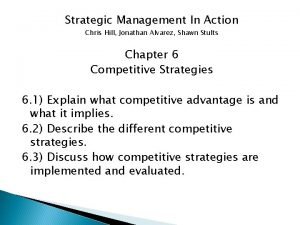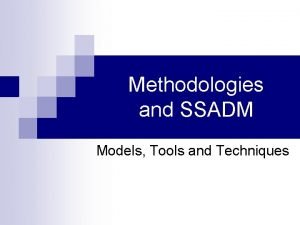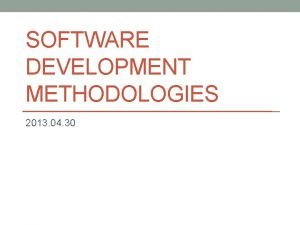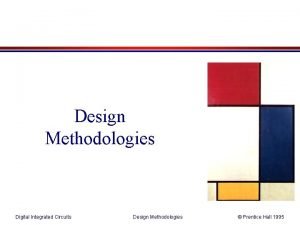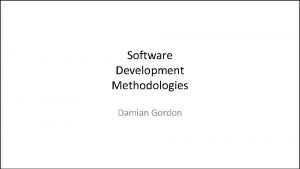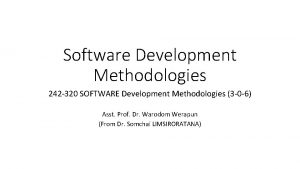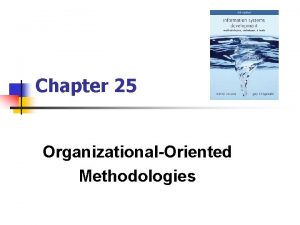Research methodologies Agns ParentThirion head of unit Surveys












- Slides: 12

Research methodologies Agnès Parent-Thirion, head of unit Surveys and Trends unit

Research in eurofound 4 Mission: generate policy-relevant research and findings which contribute to improving the quality of work and life in Europe, through: - European-wide comparative research and analysis of developments affecting living and working conditions - Monitoring of trends in the working environment - Methodologies: A combination of quantative and qualitative research methods Usually combined -> research cycle adapted to the research questions and best way to answer All research is policy-relevant and comparative/European-wide Quality assurance mechanisms Surveys, network of national observatories and other research (case study projects), …

Monitoring activities : Our surveys and observatories (NEO) European Working Conditions survey (EWCS) 1991, 95, 2000/01, 2005, 2010 European Quality of Life survey (EQLS) 2003, 2007, 2011 European Company Survey (ECS) 2004/05 / 2009 / 2012 Monitoring living and working conditions in EU European Industrial Relations Observatory (EIRO) European Restructuring Monitor (ERM)/ EMCC European Working Conditions Observatory (EWCO)

The research cycle

Different kinds of case studies in Eurofound with different aims/outcomes: a typology • exploratory case studies 4 • explanatory case studies 4 • purpose: to investigate new phenomena and identify indicators and research questions for future study purpose: scientific investigation of ‘how? ’ and ‘why? ’ research questions not readily amenable to other forms of research example case studies 4 purpose: to illustrate actual practice (good and maybe not-so-good) in order to disseminate lessons that can be learned to stakeholders

European Company Survey (ECS) • European-wide survey : 2 waves: 2004 and 2009 • Unit of enquiry : 4 establishments 10+ without agriculture, fishing and private households • Phone (CATI) interviews in 27, 160 establishments • Two interviews (where possible) in each establishment Management interview : the most senior person at the establishments level responsible for HR management 27, 160 interviews of 20 minutes 4 Employee representative : interview after that of the management, pref. the chair person, secretary or spoke person of the relevant structure representing the interests of the workers 6, 569 interviews of 15 minutes 4 • 38 language versions

European Company Survey • First survey in 2004/2005: EU 15 (2004) and 6 NMS (2005) : called also ESWT 4 4 Focus: working time and work life balance Questions around a number of WTA and consequences: - Flexible working time arrangements and working time accounts - Part-time work - Overtime and non-standard working hours - Parental and other long-term leave - Phased and early retirement - Specific policies to support work-life balance - Social dialogue around this Outcomes (performance, HR bottlenecks) • Second survey : in 2009, 30 countries (EU 27 + 3 ACC): called ECS 4 Focus : flexibility practises and social dialogue in European companies 4 Complemented with a wider range of flexibility practic some issues deepened, others more shallow - Working time flexibility practices From flexi-time to working time accounts Overtime Working at unusual hours Part time work - Organisational practices (autonomous team work, training) - Contractual flexibility & recruitment strategies - Variable pay and financial participation (profit sharing and share ownership schemes) - Social dialogue at work-place level in-depth - Outcomes (performance, HR bottlenecks)

European Working Conditions Survey (EWCS) • European wide survey – 5 waves already: 1991, 1995, 2000 (+01/02), 2005 and 2010 • 1 questionnaire / translated in all the languages 4 • • 2010: 25 languages and 16 variants Country coverage: EU + neighbour countries 4 5 th EWCS (2010): 34 countries covered : EU 27 + NO + ACC 3 + IPA 3 4 43000 interviews in total (1000/4000 interview per country) Workers survey: employees and self-employed (15+) (LFS def) 4 face to face interviews • Covers many different aspects of the conditions of work and employment of European workers (more than 100 questions) 4 Demographics, structure of workforce, job characteristics, household info (incl work at home) 4 Working time : duration, organisation 4 Physical and psychosocial work factors 4 Nature of work / place of work / work organisation 4 Job content and training 4 Work-life balance 4 Information and consultation 4 Outcomes : health, job satisfaction 4 Earnings • Gender mainstreaming : central in reflection on questionnaire

Qualitative post-test (4 th EWCS) • Objectives: to assess the measurement problems and assess measurement errors (due to questionnaire and interviewer), 4 to develop an understanding on how men and women answer to the questionnaires, as well as linguistic/cultural differences 4 to improve questionnaire in future editions of the survey 4 • Qualitative follow-up interviews 4 • In-depth semi-structured interviews, analysis at national level and consolidated level Limited nr of countries and interviews 4 Helps to understand better the survey results and helps to improve the survey

European Quality of Life Survey (EQLS) • Representative household survey of people 18+, face to face interviews • Three waves so far: 2003, 2007, 2011 (fieldwork in Autumn) + Eurobarometer (limited nr of questions) in 2009 • Covers all 27 EU Member States, plus Candidate Countries (Turkey, FYROM, Croatia) and Norway • Sample size: 1000 -2000 per country • Topic: quality of life = overall level of well-being of individuals Assessed in terms of outcomes and experiences (objective), but also how people feel about their lives (subjective) 4 Core focus on domains of employment, economic resources, family, housing, community and health – and specifically on the inter-relationships between domains (e. g. work and family, health and economic situation) 4 Addresses the quality of society – in terms of quality of services and environment, social capital and societal relations. 4

Quality control for surveys: some key principles • Planning : 4 • Learning : 4 • making the process open both internally and externally Documentation : 4 • experts and users of the survey participate in the development of the questionnaire, concepts and methodology Transparency : 4 • from other research projects, the former survey, analysis, case studies, EWCO/EIRO cars Consultation : 4 • using a systematic Quality Control framework developed specifically for the survey keeping track of everything, making sure that errors can be traced back Assessment of the quality : Quality assessment report

Thank you
 Types of research empirical vs
Types of research empirical vs System design methodologies
System design methodologies Modularity in vlsi design means
Modularity in vlsi design means Agile methodologies wiki
Agile methodologies wiki Data modelling methodologies
Data modelling methodologies People oriented methodologies
People oriented methodologies What is domain test
What is domain test Indigenous methodologies
Indigenous methodologies Business performance management methodologies
Business performance management methodologies Methodologies for cross-domain data fusion: an overview
Methodologies for cross-domain data fusion: an overview Dividing head chart
Dividing head chart The attacking firm goes head-to-head with its competitor.
The attacking firm goes head-to-head with its competitor. Tagi html
Tagi html

